Meet Emily Coronado, an outstanding UNT ecology major conducting research in Dr. Juliana
D’Andrilli’s lab. Her current research is focused on the Upper Clark Fork River (UCFR)
in Montana, where she is analyzing previously collected samples for dissolved organic carbon quality
to determine the effects of restoration on the river. 
“Once I realized that I wanted to pursue a career in environmental science, I knew I wanted to experience hands-on research while working on my degree,” she said. “I reached out to a few teachers, hoping they could find someone looking to take on new lab members, and that’s how I got to meet Dr. D’Andrilli. I was immediately interested in her work with the UCFR and found the idea of learning about the effects of restoration intriguing, especially on a project with such a high abundance of data available to explore and learn from.”
At the start of the twentieth century, the cities surrounding the headwaters of the UCFR were used for intensive mining and the river’s floodplain was full of mining contaminants, which resulted in the largest U.S. Environmental Protection Agency site of ecological restoration to-date.
“I am analyzing the absorbance and fluorescence data paired with hydrologic flow patterns, such as snow melt and spring runoff, to learn how ecological regimes change seasonally and annually to determine restoration effects on river health,” explained Emily. She hopes this work can emphasize the importance of DOC qualitative measurements to determine ecosystem health.
“Currently, much research on ecosystem health uses data from quantitative DOC measurements, focusing only on the concentrations present,” she said. “However, this does not shed light on a deeper understanding of the inputs of DOC in the ecosystem and how river processes play a role in overall health.”
Emily was recently accepted to join the Association for the Sciences of Limnology and Oceanography Multicultural Program (ASLOMP) offered in collaboration with Hampton University and the National Science Foundation.
As part of ASLOMP’s commitment to promoting diversity across discipline, country, socioeconomic status, gender and ethnicity, this program presents unique opportunities for students who are invested in the aquatic sciences. Part of Emily’s participation in ASLOMP will involve traveling to present her research for the first time at a conference in the spring. Her mentor, Dr. D’Andrilli, encouraged her to take the steps to apply for the program.
“Emily is a hardworking, enthusiastic, and delightful colleague who thrives in group settings and always advocates for open-minded thinking, creativity, and respect,” said Dr. D’Andrilli. “I know she is going to have a tremendous experience at the conference as well as during the ASLOMP events. I thoroughly enjoy working with her and am grateful every day that one of her professors, Dr. Jaime Baxter-Slye, introduced her to me.”
“This coming year, I’m looking forward to learning more about scientific conferences and gaining the experience of presenting my own research,” said Emily. “I will also be graduating in the fall of 2025, which is exciting. After I get my degree, I’m hoping to continue my education and work towards a Master of Science degree.”
Emily’s advice for fellow students pursuing STEM research is to be enthusiastic about communication. “Don't be afraid to reach out to people you might be interested in working with,” she said. “If possible, make connections and continue to stay in contact with your current teachers and see if they can help you out, either by mentioning your interests in passing or reaching out to their colleagues. First impressions are important, so wherever you go, whoever you meet, try to put your best foot forward and you’ll find the path you're meant to follow!”